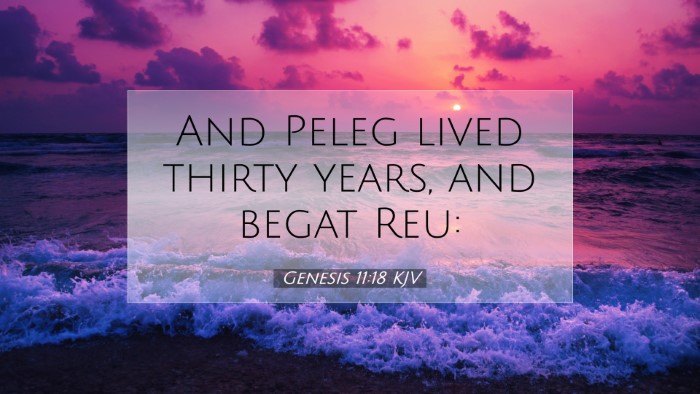Commentary on Genesis 11:18
Introduction
Genesis 11:18 states: “And Peleg lived thirty years, and became the father of Reu;” This verse appears in the broader context of the genealogy of Shem, one of Noah's sons, after the flood. It highlights the importance of lineage in the biblical narrative and offers insights into the theological implications regarding human history, divine judgment, and the establishment of nations.
Contextual Background
Genealogical Significance
Genealogies in the Bible serve several purposes: they establish lineage, fulfill prophetic declarations, and authenticate the ancestry of significant biblical figures. Matthew Henry emphasizes that these records are not mere genealogical lists but are infused with spiritual meaning and necessity. They trace the lineage of the Israelites back to Adam, establishing their identity and God’s redemptive plan.”
The Role of Peleg
Peleg is particularly noteworthy as his name means "division," which some commentators associate with the division of languages and tribes that occurred at Babel (Genesis 11:7). Albert Barnes notes that “the name Peleg has a significant implication in connection with the events following the Tower of Babel, suggesting that his life coincides with a transformative period for humanity.”
Theological Insights
Divine Sovereignty and Human History
This verse subtly indicates God’s hand in the unfolding of human history. Adam Clarke points out that while genealogy may seem repetitive, it underscores the continuity of God’s promise through generations. Each individual in the lineage, including Peleg, plays a vital role in the divine narrative that ultimately leads to the coming of Christ.
Covenantal Implications
From a covenantal perspective, the genealogy illuminates God’s covenant with Noah and his descendants, preserving humanity through a chosen lineage. The mention of Peleg emphasizes that even amidst judgment and division, God remains committed to His promises and purposes. Matthew Henry asserts, “God's grace is evident in every generation, guiding and leading His chosen people towards fulfillment of His redemptive plan.”
Applications for Life and Ministry
The Importance of Legacy
For pastors and students of the Word, this verse serves as a reminder of the importance of legacy and the impact our lives can have on future generations. Just as Peleg's life and lineage contributed to the unfolding story of salvation, we too are called to make a difference in our spheres of influence. Albert Barnes reflects on this, stating, “Every life has a purpose, and we must strive to fulfill it while leaving a legacy of faith for those who come after us.”
Unity and Division in the Body of Christ
The divisions that followed the Tower of Babel reflect the need for unity in the church today. As divisions arose in human history, they call the body of Christ to work actively toward unity and reconciliation. Adam Clarke notes, “The early church faced similar divisions, and the apostolic letters often addressed these issues, encouraging believers to maintain the unity of the Spirit.”
Conclusion
In summary, Genesis 11:18 provides rich theology and practical applications for both scholars and laypeople. It points to God’s sovereignty in human affairs, celebrates the legacy of faith, and calls for unity amidst diversity. Understanding these elements deepens our appreciation of Scripture and challenges us to live in a manner that honors our heritage and embraces our role in God’s ongoing story of redemption.


